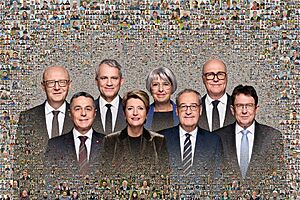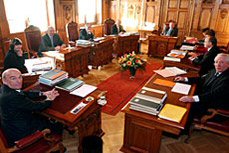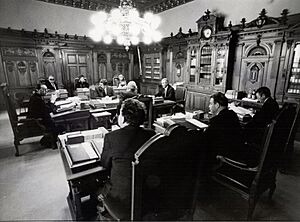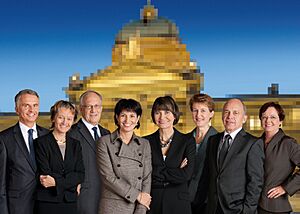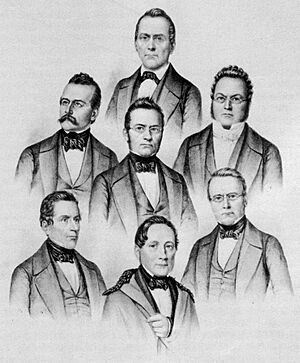Federal Council (Switzerland) facts for kids
Quick facts for kids Federal Council |
|
|---|---|
 |
|
|
Incumbent
|
|
| Style | His/Her Excellency |
| Appointer | Federal Assembly |
| Term length | Four years,
no term limits
|
| Constituting instrument | Constitution of Switzerland (2000) |
| Inaugural holder |
|
| Formation | 1848 |
| Salary | CHF 477,688 annually per councillor |
The Federal Council is like the main team of leaders for Switzerland. It's made up of seven members. These seven people work together as both the head of state (the main representative of the country) and the government (the group that runs the country).
Since World War II, the Federal Council has usually been a "grand coalition." This means it includes members from the country's biggest political parties and different language regions. This helps make sure everyone in Switzerland feels represented.
Each member of the Federal Council is in charge of one of the seven main government departments. Think of them like ministers in other countries, but they also share the top leadership role. The president of the Swiss Confederation leads the council meetings. However, this president isn't like a powerful president in other countries. They are more like a "first among equals," meaning they are just one of the seven, and their role rotates among the members each year.
The Federal Council members are chosen by the 246 members of the Federal Assembly. They are elected for a four-year term after each national election. Once elected, they usually stay in office for a long time, often 8 to 12 years. They cannot be easily removed from office.
The chancellor of Switzerland helps the Federal Council run smoothly. They are like the chief of staff for the council, but they are not one of the seven voting members.
Contents
Who Are the Members?
As of 2025, here are the members of the Federal Council, listed by how long they have served:
| Member | Portrait | Joined | Party | Canton | Job | |
|---|---|---|---|---|---|---|
| Guy Parmelin |  |
January 1, 2016 | Swiss People's Party | Vice President for 2025 Leads the Federal Department of Economic Affairs, Education and Research |
||
| Ignazio Cassis |  |
November 1, 2017 | Liberals | Leads the Federal Department of Foreign Affairs | ||
| Karin Keller-Sutter |  |
January 1, 2019 | Liberals | President for 2025 Leads the Federal Department of Finance |
||
| Albert Rösti |  |
January 1, 2023 | Swiss People's Party | Leads the Federal Department of Environment, Transport, Energy and Communications | ||
| Élisabeth Baume-Schneider |  |
January 1, 2023 | Social Democratic Party | Leads the Federal Department of Home Affairs | ||
| Beat Jans |  |
January 1, 2024 | Social Democratic Party | Leads the Federal Department of Justice and Police | ||
| Martin Pfister |  |
April 1, 2025 | Centre | Leads the Federal Department of Defence, Civil Protection and Sport | ||
How the Federal Council Started
Early Days of the Council
The Federal Council was created in 1848 with the first Federal Constitution. It was meant to be the "highest executive and managing authority" for Switzerland.
When the Constitution was written, countries were still figuring out how to have a democracy. Switzerland's founders looked at the United States Constitution for ideas on how to set up the country. But for the government's executive branch, they chose a "collegial" system instead of a presidential one. This meant a group of people would lead together. This idea fit well with Switzerland's long history of being governed by councils.
Today, only a few other countries, like Bosnia and Herzegovina, Andorra, and San Marino, have a group of people as their head of state. However, the idea of a group government where everyone shares responsibility is common in many modern democracies.
How the Council's Makeup Changed
The basic idea of the Federal Council has stayed the same since 1848, even though Switzerland has changed a lot.
Political Parties in the Council
Early Years: One Party in Charge (1848–1891)
The 1848 Constitution was a big success for democratic movements in Europe. In Switzerland, a group called the "Radicals" (now called FDP. The Liberals) led the way. At first, they had enough power in the Federal Assembly to fill all the seats on the Federal Council with their own members. This meant their old rivals, the "Catholic-Conservatives" (now the Christian Democratic People's Party), were the main opposition.
In 1891, after a public vote failed on nationalizing railways, the Radicals decided to include the Conservatives. They supported the election of Josef Zemp from the Conservative party.
More Parties Join In (1891–1959)
Over the first half of the 20th century, more of Switzerland's major political groups started to join the government. This happened because the FDP and CVP parties were slowly losing voters. New parties like the Social Democratic Party (SP) and the Party of Farmers, Traders and Independents (BGB, now the People's Party, SVP) grew stronger.
The CVP got its second seat in 1919. The BGB joined the council in 1929. During World War II, in 1943, the Social Democrats also got a temporary spot.
The "Magic Formula" (1959–2003)
After elections in 1959, a "magical formula" was created. This formula decided how many seats each major party would get on the council for the rest of the 20th century. It made the council a permanent "grand coalition." The seats were usually divided like this:
- Free Democratic Party (FDP): 2 members
- Christian Democratic People's Party (CVP): 2 members
- Social Democratic Party (SP): 2 members
- Swiss People's Party (SVP): 1 member
During this time, the FDP and CVP slowly lost voters to the SVP and SP. By the 1990s, the SVP and SP became more popular than the older parties.
Changes to the Grand Coalition (2008)
The balance of power changed after the 2003 elections. The SVP, which had grown very popular, gained a second council seat for their leader Christoph Blocher. This seat had belonged to the CVP. However, in 2007, the Federal Assembly did not re-elect Blocher. Instead, they chose Eveline Widmer-Schlumpf, another SVP politician who was seen as more moderate.
This led to a split in the SVP in 2008. Some members, including Widmer-Schlumpf, formed a new party called the Conservative Democratic Party of Switzerland. For a short time, the SVP was not in the council, which hadn't happened since 1929. But they returned when Ueli Maurer was elected in December 2008. The SVP got its second seat back in 2015 when Widmer-Schlumpf resigned and Guy Parmelin was elected.
Women in the Council
Women in Switzerland gained the right to vote in national elections in 1971. It took a while for women to join the Federal Council.
- The first woman councillor was Elisabeth Kopp, elected in 1984.
- Ruth Dreifuss was elected in 1993. She was the first woman to become President of the Confederation in 1999. Since her election, there has always been at least one woman on the council.
- In 1999, for the first time, two women served on the council at the same time.
- From 2007 to 2010, three out of seven councillors were women.
- In 2010, Simonetta Sommaruga was elected, making it four women in the government. This was the first time men were a minority on the council.
- As of 2025, there are three women on the council: Karin Keller-Sutter, Viola Amherd, and Élisabeth Baume-Schneider.
Balancing Regions and Languages
Until 1999, the Constitution said that no canton (like a state or province) could have more than one person on the Federal Council at the same time. This rule was changed in 1999. Now, the Constitution says that seats should be fairly spread out among the cantons and language groups, but it doesn't set exact numbers.
Since the rule changed, there have been times when two councillors were from the same canton. For example, from 2003 to 2007, both Moritz Leuenberger and Christoph Blocher were from the canton of Zurich.
When a member resigns, they are usually replaced by someone from the same party and language group. However, this isn't always the case. For example, in 2006, a French-speaker was replaced by a German-speaker. In 2016, a German-speaker was replaced by a French-speaker. In 2023, a German-speaker was replaced by a French-speaker.
Historically, at least two council seats have been held by French- or Italian-speakers. As of 2025, the council has four German-speakers, two French-speakers, and one Italian-speaker. Ignazio Cassis became the first Italian-speaker on the council since 1999 when he was elected in 2017.
How the Council Works
The President's Role
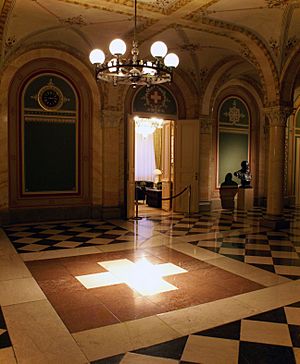
Each year, one of the seven councillors is chosen by the United Federal Assembly to be the President of the Confederation. A vice president is also chosen. By tradition, these roles rotate every year, so each councillor becomes vice president and then president every seven years they are in office.
The president is the highest-ranking Swiss official. They lead council meetings and do some official duties that a head of state would do in other countries. If there's an urgent situation and the council can't make a decision quickly, the president can act for the whole council. But other than that, they are just "first among equals," meaning they don't have more power than the other six councillors.
The president is not the only head of state for Switzerland. The entire council acts as the head of state together. However, in recent times, the president often acts as the head of state when visiting other countries. This is because the whole council doesn't usually travel together. When other heads of state visit Switzerland, the entire Federal Council welcomes them.
Council Meetings
The Federal Council usually meets every Wednesday at the Federal Palace in Bern, which is where the Swiss government is located.
Besides the seven councillors, a few other important people attend these meetings:
- The Federal Chancellor, Viktor Rossi. He helps manage the government's work and leads the Federal Chancellery. He takes part in discussions but doesn't vote. His role is so important that he's often called the "eighth Federal Councillor."
- The Vice-Chancellor, Rachel Salzmann. She is the spokesperson for the Federal Council and gives weekly press briefings after meetings.
- Another Vice-Chancellor, Jörg De Bernardi, who manages the Federal Council's work within the Chancellery.
During meetings, councillors address each other formally, even if they are friends. This helps keep the focus on the topics being discussed, not on personal feelings.
After meetings, the councillors often have lunch together. They also have special "conclave" meetings to discuss important topics in depth. Once a year, they go on a "field trip" to visit places in the president's home canton. In many ways, the council works like the board of directors for a big company.
Decisions and Responsibilities
Each Federal Councillor leads a government department, similar to how ministers work in other countries. People often call them "ministers," even though that's not their official title. For example, the person leading the Federal Department of Defence, Civil Protection and Sports is often called the "Swiss defence minister."
However, as council members, they are responsible not only for their own department but also for the work of their colleagues' departments and for the entire government.
Decisions are usually prepared by the department responsible for that topic. For example, if there's a change in federal employee salaries, the head of the Federal Department of Finance would suggest it to the council. Before a vote, all proposals are shared in writing with the heads of other departments. Their senior staff then write responses with comments and suggestions. This process helps build agreement before the council meeting.
For very important decisions, the public is sometimes asked for their opinion. Cantons, political parties, and other groups are invited to share their thoughts. This also helps identify any concerns that might lead to a public vote (a referendum) later on.
Decisions are formally made by a vote, with the majority of councillors present deciding. However, most decisions are reached by agreement, or "consensus."
Secrecy
The meetings of the Federal Council and the results of their votes are not open to the public. The records are kept secret for 50 years. Some people criticize this, saying it's not transparent. But the council says secrecy is needed to reach agreements and keep councillors independent.
How They Work Together
Because the Federal Council is a "grand coalition" of different political parties, it follows many unwritten rules. The most important is "collegiality." This means councillors are not supposed to publicly criticize each other, even if they disagree. They are expected to publicly support all council decisions, even if it goes against their own or their party's views.
Traveling Abroad
For a long time, Federal Councillors didn't travel abroad for official business. This was because the entire council, not just one person, is technically the Swiss head of state. Switzerland was mostly represented by diplomats.
After the assassination of John F. Kennedy, the council decided to send a councillor to his funeral. This helped open the door for more foreign travel. Now, councillors do travel abroad for official business, especially the head of the Federal Department of Foreign Affairs.
How Members Are Elected
The most recent Federal Council elections happened on December 13, 2023. Two members, Alain Berset and Walter Turnherr, had announced they would not run again. The other councillors were re-elected.
Here are the councillors who were re-elected:
- Guy Parmelin (SVP/VD) has served since 2016. He leads the Federal Department of Economic Affairs, Education and Research.
- Ignazio Cassis (FDP/TI) has served since 2017. He leads the Federal Department of Foreign Affairs.
- Viola Amherd (DM/VS) has served since 2019. She leads the Federal Department of Defence, Civil Protection and Sport.
- Karin Keller-Sutter (FDP/SG) has served since 2019. She leads the Federal Department of Finance.
- Albert Rösti (SVP/BE) has served since 2023. He leads the Federal Department of Environment, Transport, Energy and Communications.
- Élisabeth Baume-Schneider (SP/JU) has served since 2023. She leads the Federal Department of Home Affairs.
After Alain Berset resigned, new elections were held to replace him:
Also, Viktor Rossi (GLP) was newly elected as Federal Chancellor. Viola Amherd was chosen as President of the Swiss Confederation for 2024, and Karin Keller-Sutter as Vice President. After these elections, some councillors changed which department they led. Élisabeth Baume-Schneider took over the Federal Department of Home Affairs, and Beat Jans took over the Justice and Police Department.
The Election Process
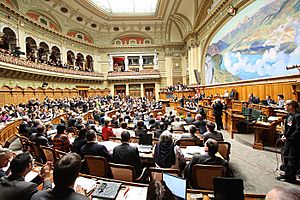
Federal Council members are elected for four years by both parts of the Federal Assembly meeting together. Each seat is voted on one by one, starting with the person who has served the longest. The winners need more than half of the votes.
Any adult Swiss citizen can technically be elected, even if they don't want to be! But in reality, only members of Parliament or cantonal governments are usually nominated by political parties. The voting happens in several rounds. If no one gets enough votes in the first rounds, candidates with fewer votes are removed until someone wins.
After being elected, the winner gives a short speech and accepts the job. They then take an oath, even though their term officially starts a few weeks later on January 1.
Usually, the party that has a seat to fill suggests two candidates. The Federal Assembly then chooses one. However, the 2003 election was very different and caused a lot of discussion.
Once elected, councillors remain members of their political parties but don't hold leadership roles in them. They often keep some distance from their party's leaders. This is because they often have to publicly support council decisions that their party (or they themselves) might not fully agree with.
Resigning from the Council
Once elected for a four-year term, Federal Councillors cannot be easily removed from office. They can be re-elected many times. It's very rare for Parliament not to re-elect a sitting councillor. This has only happened four times in history.
Because of this, councillors usually serve until they decide to resign and retire. This often happens after three to five terms in office.
Life as a Federal Councillor
Daily Life of Councillors

Unlike many top government officials in other countries, Federal Councillors don't get an official home. They usually rent apartments or hotel suites in Bern at their own cost. However, they can use the Federal Council's country estate, Lohn, for holidays. This estate is also used to host official guests of Switzerland.
While councillors can have security if needed, especially at official events, you often see them without bodyguards on the streets, in restaurants, or on trams in Bern. One former councillor, Ueli Maurer, was known for riding his bicycle to the Federal Palace most days. Councillors also have a personal bailiff (a huissier or Bundesweibel) who wears a special red and white uniform and accompanies them to official events.
The spouses of councillors don't have an official role in government, other than going with them to official parties.
Councillors' Pay
Federal councillors earn about 472,958 Swiss francs per year, plus another 30,000 francs for expenses. They pay taxes on this income.
Former councillors who served for at least four years get a pension that is half the salary of current councillors. If a councillor leaves office due to health reasons, they might get this pension even if they served less than three years. Councillors who serve less than four years might get a partial pension. After leaving office, former councillors often take on other jobs. However, their total earnings (from their new job plus their pension) cannot be more than what a current councillor earns. If it is, their pension is reduced.
Serving federal councillors get special benefits, like free phone plans, a car with a driver for official work, a car for personal use, or the use of federal planes and helicopters for official trips. Each councillor also gets a first-class train pass for life. They also have personal security, which is often very discreet.
Legal Protection
Federal Councillors, like members of Parliament, have special legal protection for things they say or do in their official job. This means they cannot be sued for these actions.
If there are accusations of crimes related to their official duties, the Federal Assembly's special committees must agree before any legal action can be taken. In such cases, Parliament can also temporarily remove the councillor from office.
It's very rare for permission to prosecute a councillor to be granted. Usually, these cases involve statements that someone found offensive. However, one councillor involved in a traffic accident chose to give up their legal protection. Also, Councillor Elisabeth Kopp resigned when she faced questions about sharing secret information.
Firsts in the Federal Council
- 1848: The first seven members were elected: Ulrich Ochsenbein, Jonas Furrer, Martin J. Munzinger, Henri Druey, Friedrich Frey-Herosé, Wilhelm Matthias Naeff, and Stefano Franscini.
- 1854: The first (and one of only four so far) sitting Federal Councillor not to be re-elected was Ulrich Ochsenbein.
- 1855: The first elected Councillor to refuse the job was Johann Jakob Stehlin.
- 1875: Numa Droz was elected and accepted the job after two others refused. He is still the youngest person ever to serve on the Federal Council.
- 1891: The first Councillor from the Christian Democratic People's Party of Switzerland was Josef Zemp.
- 1893: The first member whose father was also a member of the Council was Eugène Ruffy. In 2007, the second was elected: Eveline Widmer-Schlumpf, daughter of Leon Schlumpf.
- 1911: The oldest person to serve in office (over 80 years old) was Adolf Deucher.
- 1913: The first (and only) native Romansh speaker was Felix Calonder.
- 1930: The first councillor from the Party of Farmers, Traders and Independents (now the Swiss People's Party) was Rudolf Minger.
- 1943: The first councillor from the Social Democratic Party of Switzerland was Ernst Nobs.
- 1973: The first councillor from a working-class background was Willi Ritschard.
- 1984: The first woman Councillor was Elisabeth Kopp.
- 1993: Ruth Dreifuss was elected, the first Jewish Councillor.
- 1999: The first woman President of the Confederation was Ruth Dreifuss.
- 2010: The first time women were the majority in the Swiss Federal Council happened with the election of Simonetta Sommaruga.
How Popular Is It?
As of August 2022, about half of the Swiss population was happy with the Federal Council's work.
Images for kids
See also
 In Spanish: Consejo Federal (Suiza) para niños
In Spanish: Consejo Federal (Suiza) para niños
 | Georgia Louise Harris Brown |
 | Julian Abele |
 | Norma Merrick Sklarek |
 | William Sidney Pittman |


